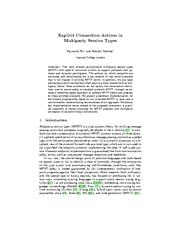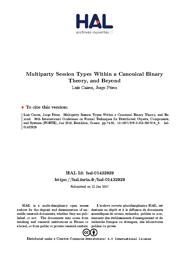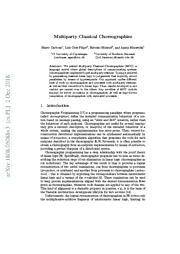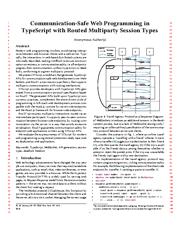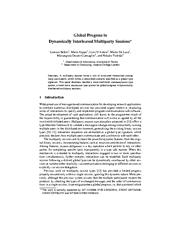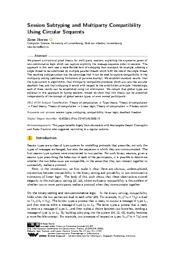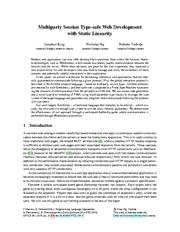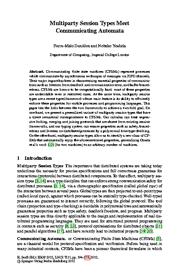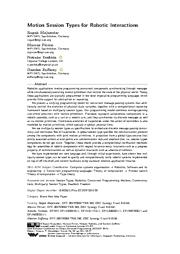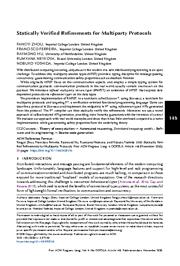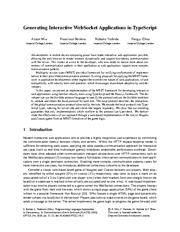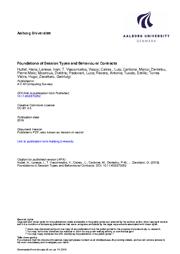A copy of this work was available on the public web and has been preserved in the Wayback Machine. The capture dates from 2018; you can also visit the original URL.
The file type is application/pdf.
Filters
Explicit Connection Actions in Multiparty Session Types
[chapter]
2017
Lecture Notes in Computer Science
This work extends asynchronous multiparty session types (MPST) with explicit connection actions to support protocols with optional and dynamic participants. ...
In addition, the use cases motivating explicit connections often require a more relaxed form of multiparty choice: these extensions do not satisfy the conservative restrictions used to ensure safety in ...
MPST with Explicit Connection Actions
Global Types, Local Types and Sessions Syntax. A core syntax of global types G and local types L is defined in Fig. 2 . ...
doi:10.1007/978-3-662-54494-5_7
fatcat:cgjqdckbbrawjfjpyu63urpvae
Multiparty Session Types Within a Canonical Binary Theory, and Beyond
[chapter]
2016
Lecture Notes in Computer Science
, thus developing the first formal connection between multiparty and binary session types. ...
., compared different multiparty session types but without connecting to binary types [11] . ...
doi:10.1007/978-3-319-39570-8_6
fatcat:loe62bpdjzeirn3crno5s5iezq
Domain-Aware Session Types
2019
International Conference on Concurrency Theory
In both cases, typed specifications 55 can be conveniently coupled with π-calculus processes [36], in which so-called session chan-56 nels connect exactly two subsystems. ...
As a specific application, we introduce domain-aware multiparty session types, in which 20 global protocols can express arbitrarily nested sub-protocols via domain migration. ...
As will be made clear in § 4, this connective plays a crucial role in ensuring the 264 correctness of our analysis of multiparty domain-aware sessions in our logical setting. 265 By developing our type ...
doi:10.4230/lipics.concur.2019.39
dblp:conf/concur/CairesPPT19
fatcat:snpx6q5y75chngm2gpkel3rwfy
Multiparty Classical Choreographies
[article]
2018
arXiv
pre-print
We present Multiparty Classical Choreographies (MCC), a language model where global descriptions of communicating systems (choreographies) implement typed multiparty sessions. ...
Our approach unifies different lines of work on choreographies and processes with multiparty sessions, as well as their connection to linear logic. ...
The first work that typed choreographies using multiparty session types is [8] . The idea of mixing choreographies with processes using multiparty session types is from [19] . ...
arXiv:1808.05088v3
fatcat:jtkdhao4dzcvdew4pzhkyaoxsi
Communication-safe web programming in TypeScript with routed multiparty session types
2021
Proceedings of the 30th ACM SIGPLAN International Conference on Compiler Construction
We present STScript, a toolchain that generates TypeScript APIs for communication-safe web development over Web-Sockets, and RouST, a new session type theory that supports multiparty communications with ...
communications without type errors or deadlocks, conforming to a given multiparty protocol. ...
Encoding of Multiparty Session Types. ...
doi:10.1145/3446804.3446854
fatcat:o3rgcbltg5a7njqygma7z3xvru
Global Progress in Dynamically Interleaved Multiparty Sessions
[chapter]
2008
Lecture Notes in Computer Science
, does not get stuck at intermediate sessions also in the presence of implicit and explicit session interleaving. ...
This paper develops, besides a more traditional communication type system, a novel static interaction type system for global progress in dynamically interleaved multiparty sessions. ⋆ The work is partially ...
We thank Kohei Honda and the Concur reviewers for their comments on an early version of this paper and Gary Brown for his collaboration on an implementation of multiparty session types. ...
doi:10.1007/978-3-540-85361-9_33
fatcat:frrbxuxipjgi7h7ifqgildki4i
Session Subtyping and Multiparty Compatibility Using Circular Sequents
2020
International Conference on Concurrency Theory
We remark that global types are optional in this approach to typing sessions; indeed we show that this theory can be presented independently of the concept of global session types, or even named participants ...
We present a structural proof theory for multi-party sessions, exploiting the expressive power of non-commutative logic which can capture explicitly the message sequence order in sessions. ...
When typing multiparty sessions we employ only T ⊗ U, representing two parallel sessions T and U that may communicate and interleave actions. ...
doi:10.4230/lipics.concur.2020.12
dblp:conf/concur/Horne20
fatcat:wcxnqve55zdb7jdkodhzogmf6e
The Challenge of Typed Expressiveness in Concurrency
[chapter]
2016
Lecture Notes in Computer Science
The work [8, 7] defines an analysis of multiparty session types (lock-free choreographies, as in [23] ) using techniques for binary session types (as in [9] ). ...
Some works connect [9, 52] and other models. Wadler [52] gives a deadlockfree fragment of the session-typed functional language in [29] by encodings into concurrent processes. ...
doi:10.1007/978-3-319-39570-8_16
fatcat:y6mx3k2dejdephkuwksc64n2ai
Multiparty Session Type-safe Web Development with Static Linearity
2019
Electronic Proceedings in Theoretical Computer Science
First, the global interaction protocol is described in the Scribble protocol language -- based on multiparty session types. ...
We demonstrate the effectiveness of our approach through a web-based Battleship game where communication is performed through WebSocket connections. ...
for connect, send and branch actions. ...
doi:10.4204/eptcs.291.4
fatcat:kuebmh4p4ncpxh7hqdxxpv5niu
Multiparty Session Types Meet Communicating Automata
[chapter]
2012
Lecture Notes in Computer Science
On one hand, we present a generalised variant of multiparty session types that have a direct semantical correspondence to CFSMs. ...
At the same time, multiparty session types are a recent typed framework whose main feature is its ability to efficiently enforce these properties for mobile processes and programming languages. ...
Local Types and CFSMs. We build the formal connection between multiparty session types, CFSMs and processes by first projecting a global type to the local type of each end-point. ...
doi:10.1007/978-3-642-28869-2_10
fatcat:b5gr7ngjxnadpkncmfbputuafu
Motion Session Types for Robotic Interactions (Brave New Idea Paper)
2019
European Conference on Object-Oriented Programming
session types. ...
A projection from a global type ensures that jointly executed actions at end-points are communication safe and deadlock-free, i.e., session-typed components do not get stuck. ...
in a multiparty motion session. ...
doi:10.4230/lipics.ecoop.2019.28
dblp:conf/ecoop/MajumdarPYZ19
fatcat:hhypo2j7sfc6fgd2j57fgwfipi
Statically verified refinements for multiparty protocols
2020
Proceedings of the ACM on Programming Languages (PACMPL)
We introduce refined multiparty session types (RMPST), an extension of MPST, that express data dependent protocols via refinement types on the data types. ...
To address this, multiparty session types (MPST) provide a typing discipline for message-passing concurrency, guaranteeing communication safety properties such as deadlock freedom. ...
A THEORY OF REFINED MULTIPARTY SESSION TYPES (RMPST) In this section, we introduce refined multiparty session types (RMPST for short). ...
doi:10.1145/3428216
fatcat:fu275gk4anhhxnxejwveib2uf4
Generating Interactive WebSocket Applications in TypeScript
2020
Electronic Proceedings in Theoretical Computer Science
Multiparty session types (MPST) provide a framework for verifying conformance of implementations to their prescribed communication protocol. ...
We show that our encoding guarantees that only implementations which conform to the protocol can type-check. ...
This work was supported in part by EPSRC projects EP/K011715/1, EP/K034413/1, EP/L00058X/1, EP/N027833/1, EP/N028201/1, and EP/T006544/1. ...
doi:10.4204/eptcs.314.2
fatcat:smf5t53w3belflzcdyczcpjcbm
Foundations of Session Types and Behavioural Contracts
2016
ACM Computing Surveys
Two related important notions of behavioural types are those of session types and behavioural contracts. This article surveys the main accomplishments of the last 20 years within these two approaches. ...
Behavioural type systems, usually associated to concurrent or distributed computations, encompass concepts such as interfaces, communication protocols, and contracts, in addition to the traditional input ...
Deniélou and Yoshida [2013] explore this connection further in the multiparty case. ...
doi:10.1145/2873052
fatcat:zpqnnmimwrglxeulwo4duwqbw4
Multiparty Compatibility in Communicating Automata: Characterisation and Synthesis of Global Session Types
[article]
2013
arXiv
pre-print
To construct a global specification from a set of distributed uncontrolled behaviours, this paper explores the problem of fully characterising multiparty session types in terms of communicating automata ...
Multiparty session types are a type system that can ensure the safety and liveness of distributed peers via the global specification of their interactions. ...
In Appendix C, we also extend our result to generalised multiparty session types, a recent class of multiparty session types [11] with graph-like control flow and parallelism. ...
arXiv:1304.1902v1
fatcat:pfnisup2nzahhpftgpv5bb34oq
« Previous
Showing results 1 — 15 out of 2,005 results

